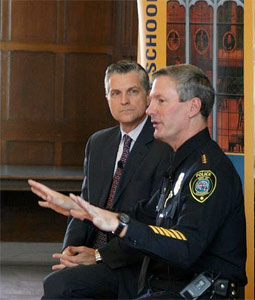 Mike Gousha began his spring-semester series of conversations “On the Issues” by hosting Milwaukee Police Chief Ed Flynn, who had come to the Law School last January within weeks of starting as chief and thus has a year under his belt (in addition to his substantial experience elsewhere). Anyone who has never heard Flynn speak is missing a treat: he is smart, extraordinarily well-spoken, and witty. A podcast of the interview, which includes as usual with Gousha questions from the audience, is available here and is well worth a listen.
Mike Gousha began his spring-semester series of conversations “On the Issues” by hosting Milwaukee Police Chief Ed Flynn, who had come to the Law School last January within weeks of starting as chief and thus has a year under his belt (in addition to his substantial experience elsewhere). Anyone who has never heard Flynn speak is missing a treat: he is smart, extraordinarily well-spoken, and witty. A podcast of the interview, which includes as usual with Gousha questions from the audience, is available here and is well worth a listen.
Perhaps the most striking part, for me, was Flynn’s description (at about the 30-minute mark) of how bad police drag good police down:
And I’m not minimizing or mitigating when I say, “Show me a hospital-ful of doctors, and I’ll show the white-coat wall of silence. Show me a roomful of attorneys, and I will show you the pinstripe wall of silence. Show me a roomful of police officers, and if we’re not thoughtful about it, we will have the blue wall of silence.”
Because the devil’s bargain becomes this—and trust me, this is the truth—the overwhelming majority of your police officers come into the job with notions of moral clarity, and they want to protect the good guys from the bad guys. They function in a world that is far more ambiguous than they thought. And they have to make the kinds of decisions which the order book doesn’t cover and the general orders don’t cover, but they live in a rule-based environment. They know they’re expected to do something, and they do things—and most of the time they’re within a margin of error of right. Sometimes they’re wrong—their colleagues know it. Sadly, over the course of the years, if you’re not careful, if you don’t have adult discussions about it, the devil’s bargain is this: The good cop who screws up makes the devil’s bargain with the cop who’s a thief or a brute, where neither one of them says anything. And that’s where you don’t want to get.
Flynn then proceeds to describe how in his estimation anyone who wishes to change this police subculture has to look upon the general police culture with a basic degree of empathy. Other aspects of the interview included Gousha’s asking Flynn to compare Milwaukee’s drop in violent crime over the past year with Chicago’s rise in the same.
To the list of adjectives that I earlier used in describing Flynn, I should add another. He seems loyal as well: he never misses the opportunity, even while appearing at this Jesuit institution, to credit the Christian Brothers, whose institutions he attended for both high school and college.
 As just reported on the Legal Writing Prof Blog, the law school will host this fall’s Central States Legal Writing Conference. The conference planning committee (led by our wonderful Alison Julien) met last Friday, and I am already excited for the event. The regional legal writing conferences tend to focus on ideas for improving our teaching, and the conference here next fall will especially emphasize reaching out to resources beyond the legal writing faculty–the librarians and other law school faculty. The blurb from the Legal Writing Prof blog website:
As just reported on the Legal Writing Prof Blog, the law school will host this fall’s Central States Legal Writing Conference. The conference planning committee (led by our wonderful Alison Julien) met last Friday, and I am already excited for the event. The regional legal writing conferences tend to focus on ideas for improving our teaching, and the conference here next fall will especially emphasize reaching out to resources beyond the legal writing faculty–the librarians and other law school faculty. The blurb from the Legal Writing Prof blog website:
